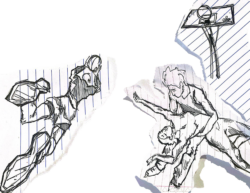Ray Lewis is not a nice guy, or at least that’s what watching him on television would make you think. He’s portrayed as ineloquent, evasive, boorish and above all unlawful. He pleaded guilty to obstructing a double-murder investigation and was fined $250,000 by his boss for his involvement. Through it all, Lewis has shown no sign of contrition, even comparing his persecution to that of Jesus. He was recently asked if there was anything he’d like to say on the record to the families of the two men who were murdered. An “I’m sorry for my involvement” or at least some sympathy for those who were grieving would have been appropriate. But Lewis’ reply: “Nah.”
Almost every person in America would find such a man loathsome if it weren’t for one reason. Ray Lewis also happens to be an exceptional athlete, the best defensive player in football and maybe the most imposing linebacker the NFL has ever seen. Without him, the Baltimore Ravens are not in the Super Bowl, they probably aren’t even in the playoffs. Sans Lewis, they’re still playing like the Cleveland Browns. Well, maybe not that bad. But rarely does one player, especially in football, have such an impact on a team. The question is, should any of this matter? Should Ray Lewis be the main attraction or is he just some sick and twisted sideshow? With all the coverage he’s gotten over the past year, you’d have to begrudgingly admit he’s the former.
Lewis is the most unlikely of media darlings, but that’s exactly the position he found himself in Tuesday at the circus that is Super Bowl Media Day. For 70 minutes he was grilled ruthlessly by reporters from all over the world. However, no matter how hard the reporters tried, Lewis never let his guard down and refused to talk about anything but football. What he did say—boring rhetoric, chock-full of improper grammar and terrible enunciation—didn’t make for much of a story. The utter lack of remorse, the smug look that often crept onto his face, the AFC champions visor he wore slightly cock-eyed, all of it was a giant thumb to the nose at the members of the media who, for the past year, had followed at his heals like a pack of hungry dogs waiting for him to dish out some savory morsel.
And what did they expect, really, all of those journalists with their pads and pens, mini-recorders, video cameras and microphones? For Lewis to come out and give an impassioned speech about how sorry he was for everything and maybe, if they were lucky, he’d throw in the names of the real murderers to boot? I mean, come on, from day one of this season, Ray Lewis has been preparing for the media. Everyone said that it was all well and good that Lewis had avoided the media’s onslaught throughout the season, but he’d never faced anything like the wolves at Media Day. They go right for the jugular. Touch?, says Lewis, proving just about every greasy-haired, overpaid sports analyst wrong. He didn’t slip up once. He was about as stoic as one could be, never taking the bait the reporters dangled in his face. Every one of them left having to fill some portion of their paper or website or evening news program, and all of them basically said the same thing—Ray Lewis isn’t talking, what a bum.
What’s really amazing though is that we all still watched or read or discussed. We watched because it’s all so horribly intriguing, the same way a car crash on the highway causes us to slow down and look. You can make all the arguments you want that the media is blowing things out of proportion. There is, lest you forget, a game to be played after all of this madness. But don’t blame the media, folks; if anyone should be ashamed it should be you and me. We’re the ones the media caters to: if we didn’t find it interesting, they wouldn’t broadcast it. All news organizations have their own agendas, but priority number one is to attract viewers. You may think half the stuff they feed you is garbage, and you’re probably right, but the stink still keeps you coming back for more.
And admit it, you remember where you were when you sneaked a peak at the O.J. Simpson verdict a few years back. I was in school and they brought a TV into the student lounge where we could watch it all unfold over Armand’s pizza. Or maybe it was President Clinton’s sex scandal that struck your fancy, had you glued to the television to get the latest from Larry King and Wolf Blitzer. What about Princess Diana or JFK Jr. or the Challenger? We’re fascinated when things go wrong, when powerful people screw up, when the rich make horrifically stupid decisions. Throw in a couple of murders, a cover-up and the biggest spectacle in the world—the Super Bowl—and you have all the ingredients for one hell of story, even if Ray Lewis isn’t totally complicit.
So, should Ray Lewis be getting the attention that he is? Yes. Is his story bigger than the Super Bowl itself? Probably. The game itself is only about three-hours long. What Ray Lewis faces will follow him the rest of his life. No matter where he goes, the questions will always be there. That’s something he will have to live with. He’s a public figure, playing a public game and is therefore open to any and all questions about his character, founded or unfounded. I’d prefer not to hear any more from people like Raven’s Head Coach Brian Billick who whined for 10 minutes about “the ambulance chasers” in the media and how everyone should just leave poor Ray Lewis alone. Well, sorry Brian, Ray Lewis gave up all his rights to a private life when he became a professional football player in a league where rules dictate players must speak frankly with members of the media. Ray Lewis dug his own hole, and now he has to climb his own way out. Shannon Sharpe can go on all the tirades he wants, but until Ray Lewis takes some responsibility for himself, the questions and flashbulbs will be a familiar sight, whether we want them to be or not.




